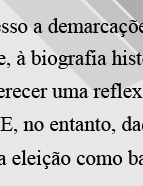

................................
1. "Illustrious Men." This ideal model of biography, or the more traditionalist way of writing it, was obviously not an ex nihilo creation or even the result of a series of essays seeking to refine a unique way of recounting a singular history. In the Portuguese case, as in others, this model or the biographical genre in general, unabashedly rooted itself methodically in panegyric literature, from hagiography to chronicles, and even to the life portraits inserted in sermons and other commemorative texts, such as funeral eulogies. The fact that this eulogistic dimension (or sometimes its opposite) has managed to persist until today, especially in works aimed at popularisation, is merely indicative of the ease with which biographical records may be adapted to the exercise of value judgment, typical of the history-courtroom, relatively constrained by rules of good historiographical practice and more or less subject to political circumstances or propagandistic intentions.
This aligns with the biographical historiography of the Ancien Regime, in its laudatory tone and in the choice of exemplary, or so-called exemplary figures as objects of study and the preferred means of representing national history. At the time when the Royal Academy of Sciences (here, ACL) was founded, history was still predominantly that of the dynasties, kings (and occasionally queens), and the great figures, as well noted by Herculano, just as it had been institutionalised decades earlier with the hallmark of the short-lived Royal Academy of Portuguese History (ARHP); and the dominant type of author was the "ecclesiastical historian," both a servant of the reigning House and a member of the Clergy, thus justifying the inclusion of notable figures, especially those with a religious background or, maxime, saint heroes. A genre that focused on individual backgrounds and made praise the mainstay of discourse was fitting for the pursuit of favours. Indeed, one of the most cited biographical works of the period, Elogios do Reis de Portugal [Praise of the Kings of Portugal](1785), expressively dedicated to the firstborn of the royal family, belongs to one of these men, namely António Pereira de Figueiredo, a canonist, theologian and member of the Real Mesa Censória [Royal Censorship Board]. Characterised by a panegyric tone, moralising content and limited circulation, his model (as announced) was the classical one of Cicero, of a master of life history, but also – as was the case much earlier in the Elogios ofFr. Bernardo de Brito –mirrors for princes; and his audience were the elites in power, who would use the examples as a guide for their own conduct (A. Herculano, “Cartas...”, 1842; Reis Torgal, “Antes de Herculano...”, 1996, p.22; A.P. Figueiredo, Elogios..., 1785, “Dedicatória”).
